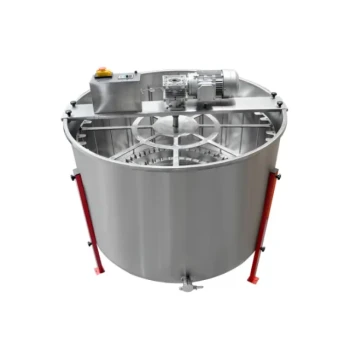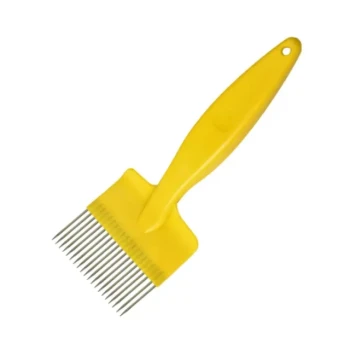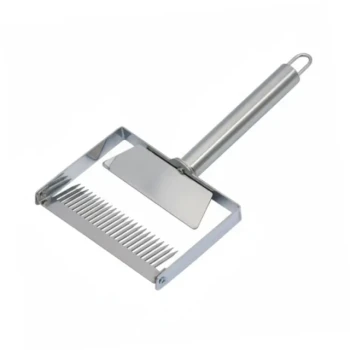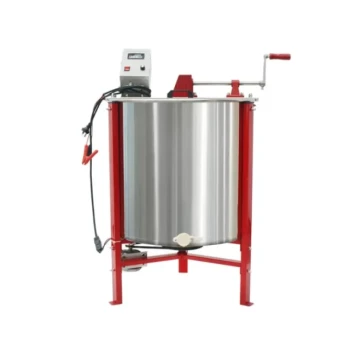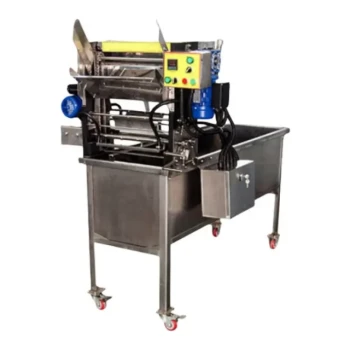At its core, honey extraction is the process of removing honey from the honeycomb. Beekeepers primarily achieve this using one of two methods: centrifugal extraction, which spins honey out of the comb while preserving the comb itself, or the more traditional "crush and strain" method, which involves crushing the entire honeycomb to release the honey.
The fundamental choice in honey extraction is not just about the tools, but about resource management for the beehive. Opting for centrifugal extraction preserves the bees' intricate wax comb, saving them immense energy and boosting future honey production.
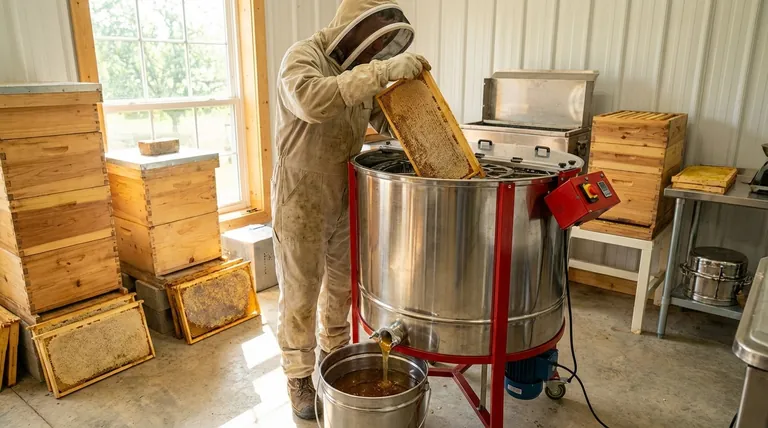
The Two Primary Extraction Philosophies
The method a beekeeper chooses depends on their scale, budget, and long-term goals for the hive. Each approach has a distinct impact on the bees and the beekeeper's workflow.
Centrifugal Extraction: Preserving the Comb
This is the most common method used by modern hobbyist and commercial beekeepers. It relies on a machine called a honey extractor.
The process uses centrifugal force to sling honey out of the open cells without destroying the delicate wax structure of the honeycomb.
By preserving the comb, beekeepers can return the empty frames to the hive. This gives the bees a massive head start, as they don't have to expend the significant energy and resources required to build new wax comb from scratch.
Crush and Strain: The Low-Tech Approach
This method is simpler and requires no specialized machinery, making it accessible for new beekeepers.
The beekeeper cuts the entire honeycomb out of the frame. The comb is then crushed, and the resulting mix of honey and wax is pressed or squeezed through a filter, like cheesecloth or a strainer.
While effective for harvesting honey, this method destroys the honeycomb. The bees must completely rebuild the comb before they can store more honey, slowing down production.
A Step-by-Step Guide to Extractor-Based Harvesting
For most beekeepers, extraction is a systematic process that begins long before the equipment is turned on.
Step 1: Determining the Right Time
Beekeepers know honey is "ripe" when the bees have finished filling the cells and have capped them with a fresh layer of beeswax. This cap signifies that the honey has been dehydrated to the correct moisture content (around 17-18%).
To be certain, many use a refractometer, a tool that measures the moisture content precisely. Harvesting honey with too much moisture can cause it to ferment and spoil.
Step 2: Clearing Bees from the Frames
Before taking the honey frames, the beekeeper must gently remove the bees. This is often done with a soft bee brush to sweep them off the comb without causing harm.
Step 3: Uncapping the Honeycomb
To get the honey out, the wax caps must be removed. This crucial step is called uncapping.
Beekeepers use a specialized hot knife or a serrated bread knife to slice off the top layer of wax, exposing the liquid honey in the cells beneath.
Step 4: Spinning the Frames
The uncapped frames are placed vertically into the wire baskets of the honey extractor.
The beekeeper then spins the frames, either with a hand crank or a motor. Centrifugal force pulls the honey out of the cells and onto the inner wall of the extractor drum. After spinning one side, the frames are flipped to extract honey from the other.
Step 5: Straining and Storing
The extracted honey pools at the bottom of the extractor. It is then drained through a spigot, typically through a strainer or filter to remove any remaining bits of wax or other debris.
The "wet" frames, now empty of honey but still sticky, are often returned to the hive for the bees to clean up and repair.
Understanding the Trade-offs
The choice between methods comes down to a balance of initial investment, efficiency, and the long-term health of the colony.
The Case for Extraction
The primary advantage is hive productivity. Because the comb is saved, the bees can immediately begin refilling it, leading to larger honey harvests over time. It is also a much cleaner and less sticky process overall. For commercial operations, high-speed, automated extractors are essential for productivity and scale.
The Case for Crush and Strain
The main benefit is the low barrier to entry. It requires no expensive equipment, making it a viable option for a first-time beekeeper with a single hive. While it destroys the comb, the separated wax can be collected and used for other purposes, like making candles or cosmetics. However, the process is significantly messier and more labor-intensive per frame.
Making the Right Choice for Your Goals
Your approach to extraction should align directly with your beekeeping objectives.
- If your primary focus is a simple, low-cost start with one or two hives: The crush and strain method is a perfectly acceptable way to harvest your first honey crop without a major investment.
- If your primary focus is long-term sustainability and maximizing honey yield: Investing in an extractor is the most efficient choice, as it conserves the bees' energy and dramatically improves the hive's productivity.
- If your primary focus is commercial production: A motorized, large-capacity extractor is an absolute necessity to handle the volume and achieve the efficiency required to be profitable.
Ultimately, choosing how to extract honey is a decision that balances the beekeeper's convenience against the bees' own precious resources.
Summary Table:
| Method | Key Feature | Impact on Bees | Best For |
|---|---|---|---|
| Centrifugal Extraction | Uses an extractor to spin honey out | Preserves comb, saves bee energy | Hobbyists & commercial apiaries |
| Crush & Strain | Crushes comb to release honey | Destroys comb, bees must rebuild | Beginners & small-scale beekeepers |
Ready to Scale Your Honey Harvest?
Whether you're a commercial apiary aiming for maximum efficiency or a distributor stocking up on reliable equipment, the right tools make all the difference. HONESTBEE supplies durable, high-performance beekeeping supplies and extraction equipment designed for wholesale operations.
Contact our experts today to discuss your needs and discover how our products can help you maximize honey yield and streamline your workflow.
Visual Guide
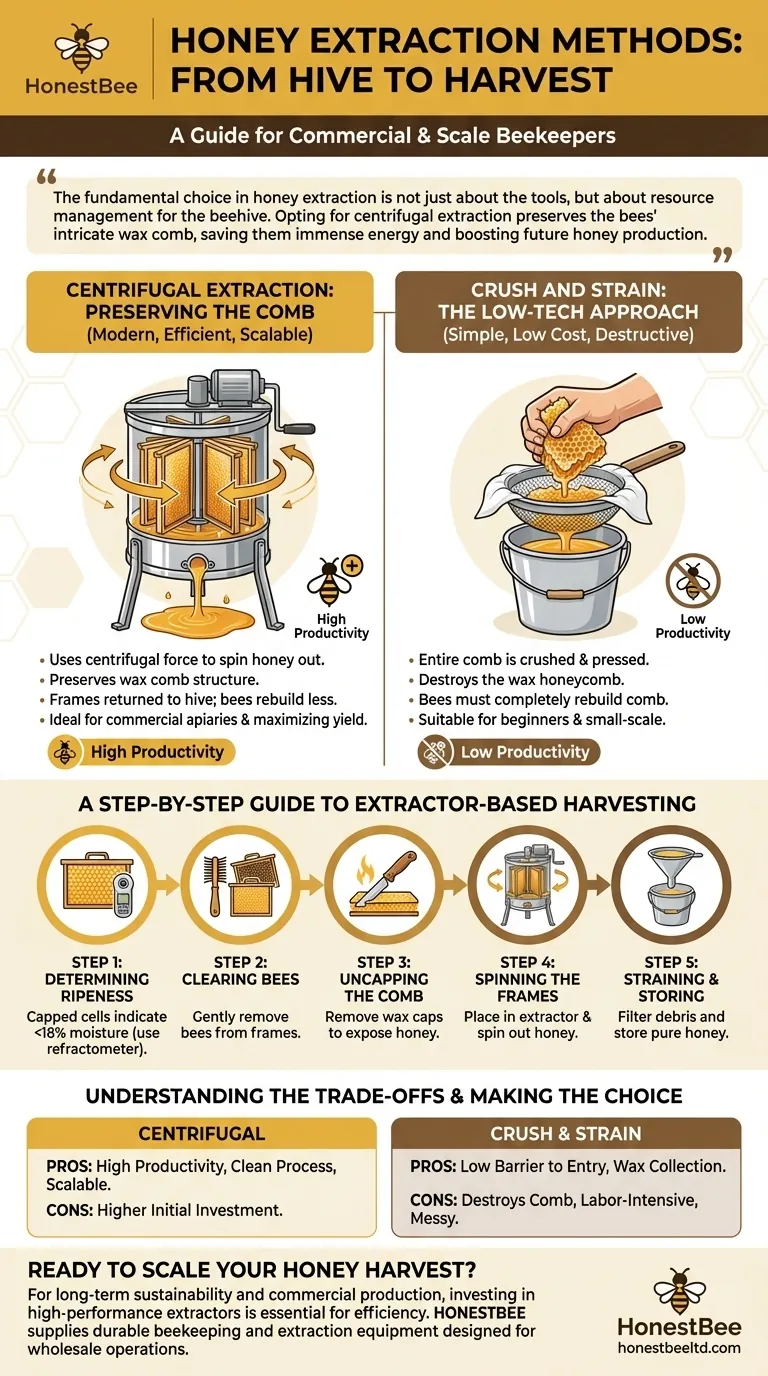
Related Products
- HONESTBEE 72 Frame Industrial Electric Honey Extractor for Beekeeping
- electric honey extractor honey centrifuge 3 frame honey extractor stainless steel honey frame extractor
- 2 Frame Stainless Steel Manual Honey Spinner Extractor for Beekeeping
- 40 Frame Commercial Electric Honey Extractor for Beekeeping
- Commercial Electric 12 Frame Honey Extractor Spinner Motorized Honey Extractor
People Also Ask
- What are the advantages of automated honey extractors in terms of time efficiency? Boost Your Harvest Speed
- How to get honey out of a frame? Choose Between Crush & Strain or Centrifugal Extraction
- What type of honey extractor is best? Maximize Your Harvest Efficiency with the Right Choice
- What are the advantages of electric honey extractors? Boost Efficiency for Your Commercial Apiary
- What are some tips for efficient electric honey extraction? Optimize Your Workflow for Maximum Yield



